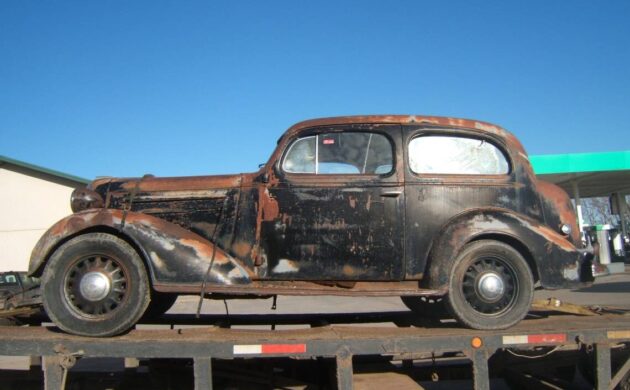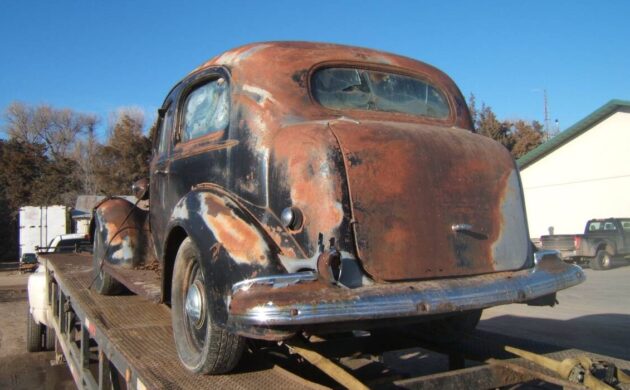Even with dents, multi-colored paint, and the harsh glare of the low winter sun, the elegant lines of this ’36 Chevy stimulate the imagination. The 1936 Chevrolet Standard Town Sedan in Fontana, California comes for sale with three pictures and a 15 word description here on Craigslist. The $3400 asking price marks a low threshold to ownership and a small fraction of what it might cost to convert this garage art into a functional motor vehicle. Thanks to reader T.J. for spotting this stock-looking specimen.
Our Chevy experts may confirm, but what looks like the shorter 109″ wheelbase should indicate a Standard compared to the upscale 113″ Master Deluxe. Check out WildAboutCarsOnline for other distinctions. My friends built and showed a gorgeous ’36 Chevy hot rod, immaculate and sleek and powerful. Picturing this rough ’36 as a muscular tarmac-skimming custom takes minimal imagination, but the execution could express every ounce of the builder’s vision, from mild to insane. Big block? Twin turbo LS? Chart your own course and make something magical from a starting point most people would consider a neighborhood eyesore.
The bustle trunk adds cargo capacity on the Town Sedan where the rear of the Coach wore a straight slanted rear and exposed spare tire. Thanks to OldCarManualProject for their collection of brochures. Reading original brochures takes us back in time. Period-appropriate hyperbole and hand-drawn illustrations often depict the cars in exaggerated proportions, artistically deviating from true scale, visually boasting about how the car does more than move you from place to place. Then, as today, vehicles represent our costliest jewelry, mechanical statements about who we are, or how we hope people see us: reliable and practical, powerful, flashy, excessive, carefree, or reckless. How would you rebuild this two-door sedan to reflect your personality?








My ’39 had the bustle back and was a better looking car than the early models in my mind. Either way, a restomod fix would really fire up this old bird.
I’m not a big restomod guy but if tastefully done they are really cool. Some kind of steelies with baby moons and keep it black.I’d put an old hopped up 283 or 327 in it with glass packs , something along those lines. Keep it kinda subtle while preserving the original lines of the body which are beautiful.No painted flames or roof chopping fo me.
Restore, restore, restore!!! There are plenty if rods out there, of all shapes and sizes, from all sorts of ‘experts’. Just look at 3-window coupes, for example. The hot rod versions are common, and barely earn a second look at the car show. But I bet you’ve never seen a restored one. They’re about as common as hens teeth.
A buddy of mine picked up one of these locally in about the same condition 10+ years ago I think for about 1/2 what this (probably) flipper is asking. He dropped the sheetmetal on an S10 frame with the the V6 & OD Auto trans. With all the modern brakes/trans/AC & pwr steering and a turbo on the 4.3 he said it cruised nicely at 70 and got 26 mpg.
I believe the afterlife penalty for rodding an original 87 year old relic is being suspended from a barn side by a rusty spike through one’s privates. A pox on all rodders.
Who cares what you believe. I’ve been a rodder my whole life and have built some nice safe cars you can put the family in and put many miles on and have fun. You are right about this car being a relic though, and someone should definitely bring it into the modern age. The generation of people that would want to keep this stock is almost gone so why restore?
It doesn’t look rusty except for surface (insert the p word) – on a limited budget I would install a 235 six and 5 speed and and a new rear end – do a general clean up – lights, brakes, tires, etc. and drive. Would be cool !
When I do my auto prints, I try to keep
everything in perspective and combine that with those wonderful rich colors that the illustrators used
back then. Van and Fitz were my heroes. Everything they did for Pontiac and GM in the ’50s and ’60s
was fabulous. Their illustrations looked more like fine paintings instead of magazine art work. As for
This car, there’s a lot here to work
with. For me, a 250 cube straight 6
and an automatic transmission would
be just fine. Add some disc brakes
and electric power steering,.Vintage
Air and heat, and call it a day. That
combo would make a great daily driver. You’d have best of old and new with that set up. Good find though.
Does it have an engine in it or did I miss something?
Whoever gets this one, please restore it.
Such beautiful lines. Rod? No! Restore and respect it for watch she is, a grand old lady. Proper restorations of such things shows respect and admiration for our parents and grandparents generations. When I am in an old car, I feel like I have gotten into a time machine, especially when on a back road with nothing modern in my view. It is wonderful.
Restore it simply because of the fact that it’s part of history……not a toy for some adult “child” to screw up. Period
I agree with Maggy, a cleanup, re-chrome, retrim, re-upholstery (red would be cool) sand and respray in black, doesn’t have to be perfect. Drop in a carbureted small block Chevy and Muncie 4 speed. Red steel hotrod rims, large rear, smaller offset up front and some big ole whitewalls! Keep it simple, keep it real.
What everyone seems to have forgotten this a wood framed body which can be a major, major pain. I learned this the hard way on my first car, a 1929 Pontiac. It was one helluva lesson.
1936 was the first year for steel framed bodies in the GM line.
Norm, I’m sure it was ’37 that featured all steel GM bodies. Years ago, I looked at a ’36 Chev 4 dr. and was astounded by the amount of (rotted) wood. I passed on it of course.
Although the 1936 Chevy had an all-steel body (“turret top”), it did have some wood framing in the doors. My first car was a 1936 Chevy Standard purchased for $100, which I acquired in 1968 at the age of 16. It ran after I replaced the points and plugs and rebuilt the carburetor. It was the oldest car in the high school parking lot by 22 years. The Standards did not have a temperature gage, and mine had a straight front axle, as opposed to the dreaded “knee action” front end. I put a rebuilt, correct 206.8 CID engine in it and drove it through my freshman year in college before selling.
Thats the reason so many GM car bodies were used as Modified stock cars , when the wood was rotting, the value went to 0 and they could be picked up cheap
A wood framed body? I know this was done a lot in the old dys but are you sure about this car? I gotta look that up.
After reading all the chirping about wood framing some research was done. According to HAMB the 1936 Master used wood framing on the doors while the standard used a metal frame door. According to the ‘Chevrolet 1936 Engineering Features – Standard Passenger Cars’ documentation :
Full length steel underbody
The site wildaboutcarsonline.com reports :
Early Standard Series had composite wood/steel doors. Later cars were all-steel.
What the new owner wants to do is their decision.
My 35 Packard had wood framing around the top where the leather section was but I didn’t see any wood anywhere else. Would this 36 be that much different?
Ever wonder why most of the 1950s stock cars were made from Dodge & Plymouth coupes? Steel bodies, which is why so few of them are around today.
Nice old car reasonably priced, should make it worthwhile to restore.
Sorry at todays restoration prices(50k) it not worth restoring unless you are a guy that can do a lot of the work.
Our feature car is an early ’36. Half way through the model year, Chevy
changed these cars slightly. The
changes included a redesigned grille,
a 2-piece windshield, and an all steel
body minus the wood. I was told this
recently by a gentleman who contracted me to make a print of his
’36 Chevy custom rod. He went on to say that these “later” cars were a lead
up to the newly styled ’37 models that
were released later on in the fall of ’36. His car is an early model that he
built into a really nice fat fendered hot
rod. Save for the chrome on the grille
and the headlight trim rings, the rest
of his car is painted white. The mono
color scheme really brings out those
beautiful body lines and the shaved
trim makes it look even better. Like
I said earlier, there’s a lot to work with
here, maybe someone will do this car
just drive.
I’ve got this same car, except a 1937. The 37 was the first all steel car. Mine has a ZZ4 350, 700R4 trans, Mustang 2 front end, air, etc., and cruises nicely at 75 MPH. I’ve been driving it finished for 23 years, and have done such trips as Tucson to Louisville Tn.,(street rod nationals) no trailer involved, and it has almost 50,000 miles as a street rod. Mine looked like this when I got it in 1998, and it was $2500.00 then. They make super highway cruisers, with plenty of room for luggage, etc.